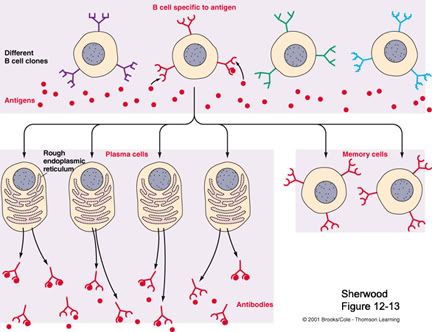
In this town where "organic" means natural and throw-backs from the 1960's hippie movement are abound, I hear a lot of complaints about science and technology and how they have created unnecessary health concerns in the wake of progress. One common charge I hear, mixed in with talk about carcinogenous pan coating and deleterious milk hormones, is that vaccination is both dangerous and ineffectual. In response, I thought it would be pertinent to report an opposing view-point, especially since many people seem to fear vaccination simply because they do not know what it is (or maybe they'd just take any excuse to avoid needles). So, here is what I understand thus far about vaccination and immunology in general:
 The purpose of vaccination is to help the adaptive branch of the immune system remember specific pathogens so that it can respond to them more quickly and efficiently during subsequent exposures. Many people understand that once they get a disease like chicken pox once, they are unlikely to get that disease (and certainly not with the same severity as before) again. The same idea is at play with vaccination, where an individual is exposed to an innocuous part of the pathogen (like viral coat proteins or bacteria cell wall) to create an immune system memory.
The purpose of vaccination is to help the adaptive branch of the immune system remember specific pathogens so that it can respond to them more quickly and efficiently during subsequent exposures. Many people understand that once they get a disease like chicken pox once, they are unlikely to get that disease (and certainly not with the same severity as before) again. The same idea is at play with vaccination, where an individual is exposed to an innocuous part of the pathogen (like viral coat proteins or bacteria cell wall) to create an immune system memory.The immune system gains this memory for pathogens through clonal selection. B lymphocytes (a type of white blood cell) with the the correct receptor for the antigen (a portion of the pathogen to which you are exposed) will populate in mass to help fight off the disease. They will also form memory B cells, which are left behind after infection to allow for an expeditious response to a repeat exposure:

The initial response of the adaptive immune branch takes 14 days, while the response takes only 6 days and is far more pronounced in vaccinated individuals or individuals who have already been exposed to the disease.
It is a mistake to suggest that vaccines are a cure all though, as individuals which are immunocompromised may still not recover from a disease even if vaccinated. It is also a mistake to suggest that everyone needs immunizations to every disease. For some individuals, their immune system is so robust that in many cases the adaptive immune branch does not even need to come into play because their innate immune responses, such as those carried out by phagocytes and natural antibiotic reagents in the tissue, is enough to destroy pathogens with in days of infection. The ability to ward off disease quickly can be very important though if the disease is particularly virulent or the individual is more susceptible (which is why doctors will recommend flu shots to the elderly more often than young adults). It is under these circumstances, where the disease is highly detrimental and contagious and the population is susceptible, that vaccination becomes essential.
Granted, there are other methods to combating infectious disease such as using serum to transmit humoral immunity (like what many people use against tetanus), but with more rapidly spreading diseases like pertussis, serum stock would run out quickly if there were a sudden outbreak. Therefore, to prevent epidemics, people are encouraged to be immunized beforehand for diseases which are particularly virulent and rapidly spreading. The entire population doesn't have to be immunized either, just enough to slow the spread of the disease to a manageable level, which is why so many people can get away with not being immunized and still remain healthy (and then suggest that immunization is useless because they themselves have never been immunized).
Vaccination has gotten a bad rap in some cases because older versions of vaccination may have contained viruses or bacteria that were not properly attenuated and some older vaccinations contained potentially harmful compounds like thimerosol, which had a high mercury content and is thought to possibly be correlated with autism. Today, vaccination preparation has vastly improved so that replicated proteins are used to initiate the immune response and thimerosol is no longer used in vaccination fluids at all.
Below is an account of the reduction in annual cases per year of a variety of diseases which can be accredited to vaccination (records from 2004):
Variola (small pox): 48,164/yr reduced to 0/yr, 100% reduction
Diphtheria: 175,885/yr reduced to 0/yr, 100% reduction
Paralytic polio: 16,316/yr reduced to 0/yr, 100% reduction
Rubeola (Measles): 503,282/yr reduced to 37/yr, 99.99% reduction
Rubella (German Measles): 47,745/yr reduced to 12/yr, 99.97% reduction
Epidemic parotitis (Mumps): 152,209/yr reduced to 236/yr, 99.85% reduction
Invasive hemophilus influemzae: 20,000/yr reduced to 172/yr, 99.14% reduction
Tetanus (Lockjaw): 1,314 (deaths)/yr reduced to 26 (cases)/yr, 98.02% reduction
Again, it is important to remember that vaccination is not a cure all and not practical against some diseases. Diseases which lay dormant or mutate quickly pose a particular challenge to immunization. Figures used to suggest that immunization has been wholly fruitless though are unjustified. Vaccination has eradicated some of the most deadly and crippling diseases on the planet, like small pox and polio. We certainly owe a lot to this incredible technology.
Source:
Immunology. Kindt, Goldsby, and Osborne. 2007


1 Comments:
You clearly haven't been talking to the anti vac crowd: "Vaccines don't work, it's all a hoax by the pharmaceutical industry. Smallpox wasn't eradicated by vaccines, no...it was wiped out by people practicing modern hygiene." The logic goes downhill from there. Thanks to these people, some childhood diseases are now making a comeback as the percentage of the population vaccinated drops. Jesus wept.
By Unknown, at 7:04 AM
Unknown, at 7:04 AM
Post a Comment
<< Home